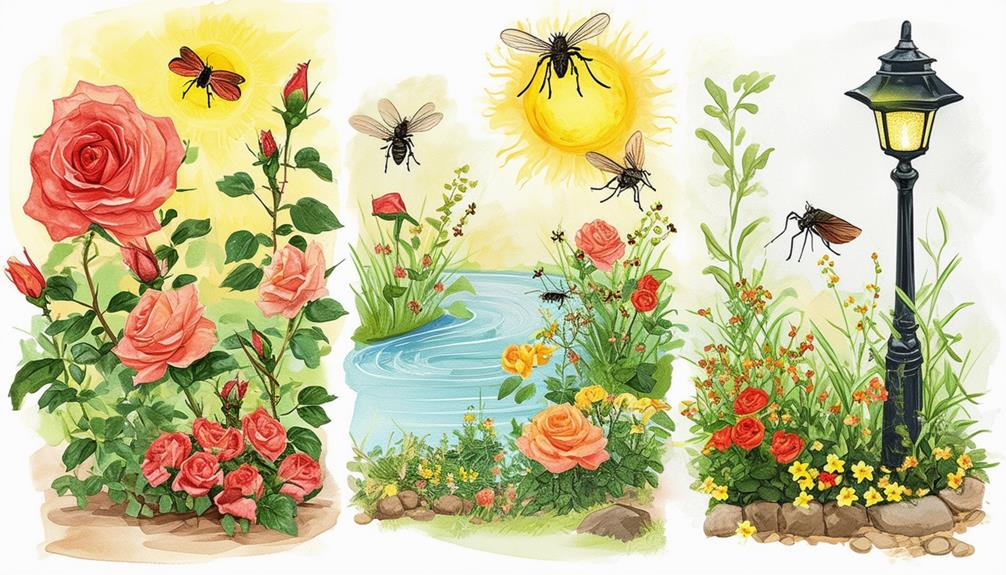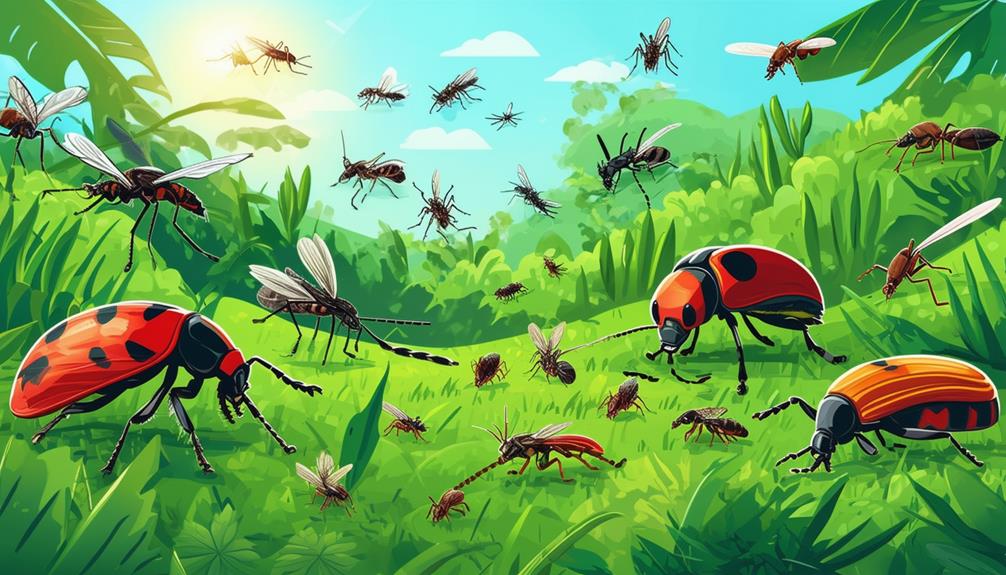In the vast ecosystem of our homes, where humans coexist with various organisms, bugs often find their way into our living spaces. These common household bugs can be a nuisance, affecting our comfort and potentially posing health risks.
According to a study conducted by the National Pest Management Association, it is estimated that over 80% of American households experience issues with pests, with cockroaches, ants, and spiders being among the most prevalent.
As homeowners, it is essential to be equipped with knowledge on how to eliminate these unwanted guests effectively and ensure a bug-free environment for ourselves and those we serve.
To address the issue of common household bugs, prevention is key. Keeping our homes clean and tidy plays a vital role in minimizing the presence of these pests. Regularly cleaning up food spills, sealing cracks and crevices, and storing food in airtight containers are simple yet effective measures that can significantly reduce the attractiveness of our homes to bugs.
Additionally, bug sprays can be a convenient and effective way to kill and repel common household bugs. These sprays typically contain chemical compounds that target and disrupt the nervous systems of insects, leading to their demise. However, it is important to follow instructions carefully and exercise caution when using these products, as they can be harmful if misused.
Prevention is Key: Keep Your Home Clean and Tidy
Maintaining a clean and tidy home is crucial in preventing the proliferation of common household bugs, ensuring a safe and comfortable living environment for both residents and visitors.
One of the key benefits of decluttering is that it eliminates hiding places for bugs. Cluttered areas provide ample hiding spots for pests such as cockroaches, bed bugs, and ants. By regularly decluttering and organizing your living space, you reduce the likelihood of bugs finding a suitable habitat to breed and thrive.
In addition to decluttering, regular cleaning plays a vital role in keeping bugs away. Common household bugs are attracted to food and water sources, and a dirty home provides an ideal environment for them. Regular cleaning not only removes food crumbs and spills that can attract bugs, but it also helps eliminate any potential breeding grounds.
Sweeping, vacuuming, and mopping floors, wiping down surfaces, and keeping kitchen areas clean are effective ways to deny bugs the resources they need to survive. By incorporating regular cleaning into your routine, you create an unwelcoming environment for common household bugs.
Transitioning into the subsequent section about ‘bug sprays: effective and convenient bug killers,’ it is important to note that while maintaining a clean and tidy home is an essential preventive measure, sometimes additional interventions may be necessary for complete bug eradication.
Bug Sprays: Effective and Convenient Bug Killers
Ensuring a bug-free environment can be achieved through the application of bug sprays, which act as a powerful shield against the unwelcome presence of these tiny intruders, just like a fortress defends its territory. Bug sprays are formulated with potent chemicals that are designed to kill and repel common household bugs such as ants, cockroaches, mosquitoes, and flies. These sprays work by targeting the nervous system of the insects, disrupting their neurotransmitters and ultimately leading to their demise. The effectiveness of bug sprays lies in their ability to not only kill bugs on contact but also provide residual protection, keeping the treated areas bug-free for an extended period.
One of the notable advantages of bug sprays is their convenience and ease of use. With just a simple press of a button, you can create a protective barrier around your home, effectively eliminating bugs and preventing their return. Bug sprays can be applied on various surfaces, including walls, floors, and furniture, making them versatile in targeting bugs in different areas of the house. Additionally, bug sprays come in different formulations, such as aerosols, pump sprays, and insecticide concentrates, allowing users to choose the most suitable option for their specific needs.
However, it is important to consider the potential drawbacks of bug sprays. Some individuals may be sensitive or allergic to the chemicals present in these sprays, leading to skin irritation or respiratory issues. It is crucial to read and follow the instructions provided by the manufacturer to ensure safe and proper usage. Furthermore, bug sprays may have a strong odor and leave residues on surfaces, which can be undesirable for some individuals.
While bug sprays are an effective option for bug control, there are also alternative methods available. Traps, for instance, offer another approach to catch and eliminate bugs with ease. These traps use attractants or pheromones to lure insects, capturing them inside a container or sticky surface. This alternative method can be particularly useful for targeting specific types of bugs or in situations where the use of bug sprays is not feasible or preferred. Transitioning into the subsequent section about traps, these alternatives provide a different approach to bug control and can be considered as complementary options to bug sprays.
Traps: Catch and Eliminate Bugs with Ease
Traps offer a convenient and efficient method for capturing and eliminating various types of insects, providing an alternative approach to bug control.
There are different types of traps available, including DIY bug traps and electronic bug traps, each with its own advantages and effectiveness.
- DIY bug traps: Homemade solutions to catch and eliminate bugs have gained popularity due to their cost-effectiveness and ease of use. These traps can be made using simple household items such as jars, plastic bottles, or sticky paper.
For example, a common DIY trap for fruit flies involves using a jar with a small hole in the lid, filled with a mixture of vinegar and dish soap. The fruit flies are attracted to the vinegar, enter the jar through the hole, but are unable to escape.
Similarly, sticky traps made with paper coated in adhesive can effectively catch crawling insects such as cockroaches or ants.
DIY bug traps provide an affordable and accessible option for homeowners who prefer a hands-on approach to bug control.
- Electronic bug traps: For those seeking a more high-tech solution, electronic bug traps offer advanced features to attract and eliminate insects. These devices use a combination of ultraviolet light, heat, and pheromones to lure bugs into the trap. Once inside, the insects are either electrocuted or trapped in a container.
Electronic bug traps are especially effective against mosquitoes and other flying insects. Some models even have a built-in fan that creates a vacuum-like effect, sucking the insects into the trap.
These devices are often designed to be safe for indoor use and can cover a large area.
Electronic bug traps provide a convenient and efficient way to control insect populations without the need for constant monitoring.
Transitioning into the subsequent section about ‘natural remedies: eco-friendly bug killers,’ it is important to explore alternative approaches to bug control that prioritize environmental sustainability and safety.
Natural Remedies: Eco-Friendly Bug Killers
One effective approach to environmentally friendly bug control involves the use of natural remedies, which can provide a safer and more sustainable alternative to traditional methods.
Eco-friendly alternatives, such as DIY bug repellents, can be easily made at home using common household ingredients.
For instance, the use of essential oils such as citronella, lavender, or peppermint has been shown to repel insects and create a pleasant aroma in outdoor spaces, allowing individuals to enjoy their time outside without the annoyance of buzzing pests.
These essential oils contain compounds that insects find repulsive, making them effective natural repellents.
Additionally, certain plants like marigolds, basil, and rosemary can be planted in gardens to deter bugs.
These plants release natural scents that repel insects, reducing the need for chemical-based pesticides.
By utilizing these eco-friendly alternatives, individuals can take proactive steps towards bug control while minimizing the negative impact on the environment.
When all else fails, professional pest control may be necessary to address severe infestations.
While natural remedies and DIY bug repellents can be effective in many cases, some situations may require the expertise of professionals.
Pest control professionals have access to specialized equipment and knowledge to identify and exterminate stubborn bug populations effectively.
Although this approach may involve the use of chemical pesticides, professionals are trained to handle them safely and minimize any potential harm to humans or the environment.
Therefore, it is crucial to consider professional pest control as a last resort when natural remedies and DIY solutions have proven ineffective.
Transitioning into the subsequent section about professional pest control allows for a comprehensive understanding of bug control methods and ensures that all avenues have been explored before resorting to more intensive measures.
Professional Pest Control: When All Else Fails
Professional pest control services offer effective solutions for addressing severe bug infestations, providing specialized expertise and equipment to eradicate persistent populations. When all else fails, homeowners can turn to these professionals to deal with common household bugs and their behaviors. Pest control companies utilize a variety of methods to eliminate infestations, including chemical sprays, traps, and heat treatments. These alternatives are designed to target specific bugs and their specific behaviors, ensuring the most effective eradication possible.
Chemical sprays are commonly used in professional pest control to kill a wide range of bugs. These sprays contain pesticides that are specifically formulated to target the nervous systems of insects, leading to their demise. Pest control professionals are knowledgeable about the different types of bugs and their behaviors, allowing them to choose the most appropriate chemicals for the specific infestation.
Traps are another effective method used by pest control companies. These traps are designed to attract and capture bugs, preventing them from reproducing and spreading further. Some traps use pheromones or food bait to lure bugs, while others use sticky surfaces or physical barriers to catch them.
Heat treatments are also utilized in certain cases, particularly for bed bug infestations. By raising the temperature of the affected area to a level that is lethal to bed bugs, pest control professionals can effectively eliminate these persistent pests.
Professional pest control services offer effective alternatives for addressing severe bug infestations. By utilizing specialized expertise and equipment, these professionals can target common household bugs and their behaviors, ensuring an efficient eradication process. Chemical sprays, traps, and heat treatments are just a few examples of the methods employed by pest control companies to eliminate infestations. Homeowners can rely on these experts to effectively address bug problems when all other remedies have failed.
Frequently Asked Questions
Can common household bugs be prevented by simply keeping the house clean and tidy?
Natural remedies can be effective in preventing common household bugs, but may have limitations. Hiring a professional pest control service offers numerous benefits, such as expertise, targeted treatments, and long-term prevention, ensuring a bug-free environment.
Are bug sprays safe for use around children and pets?
Bug sprays, although effective in killing bugs, should be used cautiously around children and pets due to their potential health risks. Alternative methods for pest control around children and pets include natural repellents and maintaining a clean living environment.
How do bug traps work and what types of bugs do they catch?
Bug traps are effective in catching various bug species. They employ different trapping mechanisms such as sticky surfaces, pheromone lures, or ultraviolet lights to attract and capture insects. Their success depends on the specific type of bug being targeted.
What are some natural remedies for killing common household bugs?
Natural remedies for killing common household bugs, such as vinegar, essential oils, and diatomaceous earth, are commonly used. However, their effectiveness varies depending on the type of bug and infestation. Ultrasonic pest repellents have mixed reviews and limited scientific evidence.
When should I consider hiring a professional pest control service instead of using DIY methods?
The benefits of professional pest control include expertise in identifying and treating infestations, access to specialized equipment and chemicals, and the assurance of long-term pest management. DIY methods may pose potential dangers, such as ineffective treatment and exposure to hazardous substances.





